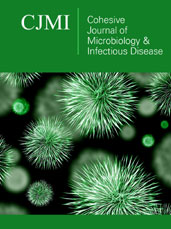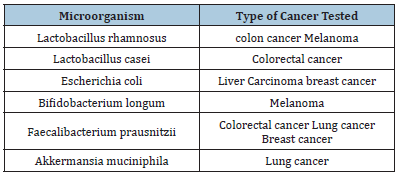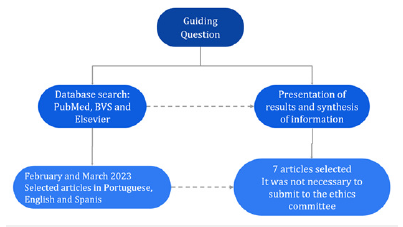- Submissions

Full Text
Cohesive Journal of Microbiology & Infectious Disease
Use of Probiotic Immunotherapy in Cancer Patients
Sávio Benvindo Ferreira1*, Igor de Sousa Oliveira1, Bernardina de Paixão Santos1, Gisvaldo Cavalcante Prado Filho1 and Hélida Maravilha Dantas e Sousa Almeida2
1Teacher Training Center (CFP), Federal University of Campina Grande, Brazil
2Health Sciences Center, Federal University of Rio Grande do Norte Natal Rio Grande do Norte, Brazil
*Corresponding author: Sávio Benvindo Ferreira, Teacher Training Center (CFP), Federal University of Campina Grande, Sergio Moreira de Figueiredo, Casas Populares, Cajazeiras, Paraíba, Brazil
Submission: March 01, 2023; Published: April 18, 2023

ISSN 2578-0190 Volume6 issues4
Abstract
The potential of the intestinal microbiota in maintaining the organic balance has gained focus over the last few years. Probiotics are microorganisms that help restore and increase the microbiota present in the body, providing the individual with greater stability and response to aggressions. This study aims to evaluate the immunotherapeutic potential of probiotics in cancer patients. The methodology adopted was a narrative review with a guiding question outlined according to the PICo strategy. The scientific search was carried out in the electronic databases PubMed, BVS and Elsevier, using the descriptors: probiotic immunotherapy and cancer patients. After reading the titles and abstracts, the selected works were studied in full. Within their spectrum of action, it was observed in the literature that in addition to their antitumor potential, probiotics have antioxidant, anti-inflammatory and neuroprotective properties. The intrinsic properties of such microorganisms led this study to search the available literature for lines of evidence between the administration of probiotics and the immunological benefits. Data obtained indicates a beneficial role of probiotics in the prevention of carcinogenesis and open up new therapeutic alternatives for cancer patients.
Keywords: Immunotherapy; Probiotics; Cancer
Abbreviations:VHL: Virtual Health Library; TGF -β: Transforming Growth Factor Beta; EcN: Escherichia coli Nissle 1917; Gal: Galunisertib; NGPS: Next Generation Probiotics, ICB: Immune Checkpoint Blockade; LPS: Lipopolysaccharides
Introduction
Cancer is a multifaceted disease that affects the body in various ways, bringing various harm to its carriers. Despite the advances that have taken place in the fight against this highlighted pathological process, immunotherapy with anti-CTLA4 and anti-PD-1 checkpoint inhibition, BRAF and MET inhibitors, cancer persists with a poor prognosis and about two million of new cases were notified only in the USA in 2023, still in this year, it is estimated that around 600 thousand people will die from this disease [1]. Furthermore, the microbiome began to receive due recognition for its performance in terms of immune, antioxidant and antitumor responses. The identification of the anticancer resource presents itself as a promising therapeutic strategy for the treatment of the disease. In this context, the probiotics appear as microorganisms that act through several anticancer mechanisms, namely: they prevent the colonization of pathogenic bacteria, improve the barrier function by increasing mucin production and the expression of tight junction proteins, promote immune and antiinflammatory response and they enable apoptosis in cancer cells [2,3].
From this perspective, there is an inherent need for technological and health advancement to seek new alternatives for coping with cancer, since therapeutic strategies are diverse, but effectiveness still has limitations. With that, when identifying in the intestinal microbiota a broad beneficial potential to the immunological and, above all, antitumor reaction, it is understood that the probiotics present promising results in the fight against this disease [1]. It is of fundamental importance to analyze the pathology and show that its multicity gives it unique characteristics, which are also responsible for making its combat more imprecise. Given this, with this prior knowledge, it is known that probiotics showed results in cancer patients with lung cancer, some melanomas, and renal carcinomas [4]. Therefore, these microorganisms can be a promising therapeutic alternative that aims to improve the life expectancy and quality of life of individuals with cancer. Knowing this scenario and extolling the need for therapeutic innovations in the field of antitumor therapy, this study aims to evaluate the potential of probiotics as immunotherapy based on reports in scientific literature.
Methodology
Research characterization
The present study is a narrative review of the literature. This review seeks to explore, describe, and discuss evidence on innovative strategies that use probiotics as immunotherapy based on analysis of the existing scientific literature. The methodological protocol was based on Almeida et al. [5] & Prado Filho et al. [6] the PICo strategy was used to outline the following guiding research question: What is the use of Probiotics (P) in Immunotherapy (I) in cancer patients (Co)?
Conducting the investigation
The selection of articles was carried out through a scientific search in the electronic databases PubMed, Virtual Health Library (VHL) and Elsevier in the period corresponding to February and March 2023. The following descriptors were considered for search purposes: probiotic, immune therapy and cancer patients, associated with Boolean operators (OR and AND) and without temporal delimitation.
Selection criteria
The determining criteria for choosing the study were to have, in its title, abstract or body of the text, an approach related to probiotic immunotherapy especially in patients with cancer, or in preclinical models that mimic the pathology. The search languages were in Portuguese, English or Spanish, opting for the choice of studies published as articles available in full format, expanded abstracts, theses and reviews. Duplicate articles were excluded from the search.
Presentation of findings and synthesis of information
From the selection, an exploratory reading and analysis of the works that make up the sample was carried out and then the collection of essential data to solve the guiding question. The results obtained were organized in a descriptive and critical composition, also exploring new proposals directed to the theme in question. The bibliographies that supported this work are publicly available, so it was not necessary to submit them to the Research Ethics Committee (CEP).
Result and Discussion
Probiotics are live microorganisms that, when consumed, confer health benefits to the individual. They cause an impact on the intestinal microbiota by conferring resistance and modulating the immune response. Given the above, several bacteria have been used as probiotics and demonstrated therapeutic potential in different types of cancer [3] some examples are available in Table 1. Currently, it is noted that the interest in exploring the field of immunotherapy using probiotics as a therapeutic agent has been growing and new representatives are being developed with the aim of promoting more precise changes in the intestinal microbiota in order to produce an anticancer immune response [7].
Table 1:Main microorganisms tested in cancer immunotherapy.

This investigation was based on 7 articles that somehow validated this immunotherapeutic potential of probiotics. In view of this sample, it was seen that among the various strategies that have already been developed to fight tumors, the intestinal microbiota has recently brought a great advance in immunotherapy. Several bacteria that compose it have been associated with increased tumor immunity. O Lactobacillus, for example, showed an anti-PD-1 response, preventing the immune response against malignant cells in colorectal cancer tumor models. Similarly, strains of Lactobacillus, called L. paracasei sh 2020, demonstrated remarkable antitumor response in mouse intestines [8].
The use of probiotics also showed immunotherapeutic potential when associated with inhibitors of the protein responsible for cell proliferation and differentiation (TGF-β). Thus, a study carried out in China, in 2019, showed promising results in models of breast and liver cancer, inoculated in mice subcutaneously. Escherichia coli strain Nissle 1917 (EcN) was used orally administered daily in parallel with therapy with Galunisertib (Gal), a Transforming Growth Factor (TGF-β) that presents itself as a potential candidate for tumor immunotherapy. Thus, it was verified that tumor growth regressed considerably and EcN had the ability to significantly suppress metastasis due to the strengthening of tumor immunity, provided relief from the immunosuppressive tumor microenvironment and promoted beneficial changes in the intestinal microbiota [9].
The so-called Next-Generation Probiotics (NGPS), including Faecalibacterium prausnitzii, Akkermansia muciniphila and Bacteroides fragilis, are present in the digestive system and act beneficially. Notably, they demonstrated improvements in the immune system, decreased signaling related to Lipopolysaccharides (LPS), improved the activity of the intestinal microbiota, maintaining the integrity of its barrier. Furthermore, F prausntizii was effective in reducing gastrointestinal complications associated with chemotherapy and radiotherapy, while A muciniphila can make immunotherapy more efficient. However, A muciniphila can cause colitis, while B fragilis enterotoxigenic causes chronic inflammation and may cause colorectal cancer. Furthermore, nontoxigenic strains of B fragilis present as the best therapeutic option among the NGPS, as they are beneficial to the host by promoting intestinal homeostasis [7].
One study looked at the effect of probiotics Lactobacillus rhamnosus, Probio-M9, in tumor-bearing mice with the objective of recovering intestinal microbiota that was interrupted by the previous administration of antibiotics. The results showed that Probio-M 9 acted in synergy with immune checkpoint therapy (ICB) and considerably improved tumor inhibition compared to groups that did not receive probiotics. In addition, the use of probiotics caused a significant increase in beneficial bacteria: Bifidobacterium pseudolongum, Parabacteroides distasonis and some species of Bacteroides. Through this study it was found that probiotics could be related to the responsiveness of immunotherapy based on anti-PD-1, and Probio-M9 presented as a potential candidate for synergistic tumor therapy from microorganisms [10].
.It is well known that more and more cancer patients are making supplemental use of probiotics in order to promote intestinal health. In this context, a study profiled the intestinal/fecal microbiome and evaluated the clinical and pathological outcomes of 438 patients with melanoma. It was observed that patients who used a probiotic supplement before starting ICB treatment showed considerable improvements, including weight reduction, improved food intake and less propensity to take statins, compared to patients who did not use probiotic. Thus, even if the objective of cure is not achieved, the results point to an integral improvement of the patients, since the use of probiotics causes positive systemic effects, thus improving the quality of life (Figure 1).
Figure 1:Methodological path covered.

Conclusion
Due to their immunological impact, probiotics present a therapeutic possibility in many conditions. Overall, emerging studies indicate a beneficial role for probiotics in preventing carcinogenesis and open promising new therapeutic possibilities for cancer patients. In view of the above, the therapeutic potential of probiotics was glimpsed in several evidence, such as when administering Lactobacillus in mice, demonstrating efficacy in colorectal and intestinal tumors. In addition to presenting promising results such as increased tumor immunity and suppression of metastasis. It is worth mentioning that, in addition to the antitumor potential, probiotics provided an improvement in the quality of life of cancer patients, especially those related to gastrointestinal problems, reducing symptoms of irritable bowel, diarrhea and constipation. Finally, this work aims to expand means for new immunotherapeutic approaches for the prevention and treatment of cancer. Studies that address this topic are relatively scarce, so there is a need for more investigations that provide more evidence about the immunotherapeutic potential of probiotics, especially in clinical studies that address their effectiveness in cancer patients.
References
- Siegel RL, Kimberly D, Nikita S, Ahmedin J (2023) Cancer statistics 2023. CA: A Cancer Journal for Clinicians 73(1): 17-48.
- Fyza YS, Joell JG, Cynthia LS (2019) Impact of the microbiome on checkpoint inhibitor treatment in patients with non-small cell lung cancer and melanoma. E Biomedicine 48: 642-647.
- Perillo F, Chiara A, Francesco S, Maria R, Angélica D, et al. (2020) Gut microbiota manipulation as a tool for colorectal cancer management: Recent advances in its use for therapeutic purposes. International Journal of Molecular Sciences 21(15): 5389.
- Almeida, Hélida MD, Sousa (2022) Anti-bacterial perspective of non-antibiotic drugs. Medical Sciences Forum 12(1): 22.
- Prado F, Gisvaldo C (2023) The use of aminonitriles as a possible alternative antibiotic strategy. Curr Tr Biotech & Microbe 3(3): 582-585.
- Kaźmierczak S, Theodore H, Renata D, Natalia M (2022) Next-generation probiotics-do they open new therapeutic strategies for cancer patients. Gut Microbes 14(1): 2035659.
- Zhang, Shi L, Bing H, YuQ, Zheng Y (2022) Lacticaseibacillus Paracasei Sh 2020 induced antitumor immunity and synergized with anti-programmed cell death 1 to reduce tumor burden in mice. Gut Microbes 14(1): 2046246.
- Shi L (2019) Combination therapy of TGF- β blockade and commensal-derived probiotics provides enhanced antitumor immune response and tumor suppression. Theranostics 9(14): 4115-4129.
- Gao, Guangqi, Tao Z, Hao J, Yalin L (2021) Adjunctive probiotic lactobacillus rhamnosus probio-m9 administration enhances the effect of anti-pd-1 antitumor therapy via restoring antibiotic-disrupted gut microbiota. Frontiers in Immunology 12: 772532.
- Spencer, Christine N (2021) Dietary fiber and probiotics influence the gut microbiome and melanoma immunotherapy response. Science 374(6575): 1632-1640.
© 2023, Sávio Benvindo Ferreira. This is an open access article distributed under the terms of the Creative Commons Attribution License , which permits unrestricted use, distribution, and build upon your work non-commercially.
 a Creative Commons Attribution 4.0 International License. Based on a work at www.crimsonpublishers.com.
Best viewed in
a Creative Commons Attribution 4.0 International License. Based on a work at www.crimsonpublishers.com.
Best viewed in 







.jpg)






























 Editorial Board Registrations
Editorial Board Registrations Submit your Article
Submit your Article Refer a Friend
Refer a Friend Advertise With Us
Advertise With Us
.jpg)






.jpg)














.bmp)
.jpg)
.png)
.jpg)










.jpg)






.png)

.png)



.png)






